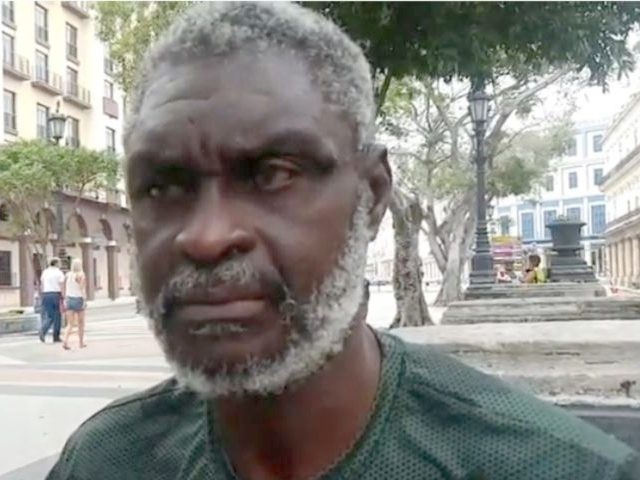Cuban political dissident Silverio Portal Contreras, serving a four-year prison sentence for “disrespect” to the communist regime, has lost sight in one of his eyes after a particularly vicious police beating, his wife denounced this week.
Wife Lucinda González told the U.S.-based Radio Martí that she was unable to speak to her husband, but a fellow inmate contacted her to let her know of his situation.
“An inmate called me yesterday [and told me] that he had been taken out of the punishment cell, and that he can’t see out of the eye where they beat him,” González told Martí, as translated by the Cuban-American outlet Babalú Blog. “After three months of being in prison, Silverio suffered a thrombosis. The right side (of his face) is paralyzed and blood flow to the area has been limited. They say that on April 23rd he had two more episodes, according to what they told me.”
González said that police arrived in her home on May 14 to retrieve her husband’s medications and other personal items, shortly before the unidentified inmate warned that “they gave him [Portal] a tremendous beating.” The inmate also said that Portal had recently spent time in an isolation cell as punishment but had been released. The beating that blinded him in one of his eyes presumably occurred while police detained him in a punishment cell.
Cuba uses “punishment cells” to isolate and torture political prisoners.
Portal is a member of a dissident group called Independent and Democratic Cuba and has engaged in activism alongside one of the largest dissident groups on the island, the Ladies in White. He was convicted in April 2018 of the uniquely communist crime of “disrespect,” a catch-all for criticism of the Castro regime. According to Amnesty International, which has certified his status as a political prisoner, he was first arrested in 2016 for shouting “down with Fidel Castro, down with Raúl [Castro]” in a tourist area of Havana. He had also publicly condemned the regime for not investing at all in maintaining Havana’s infrastructure, resulting in multiple deadly building collapses.
He has since suffered increasingly severe health problems believed to be exacerbated by beatings and torture behind bars.
A week before González clarified his status to Radio Martí, the International Institute on Race, Equality, and Human Rights issued a public plea for information regarding Portal’s health status.
“He is 56 years old. Early in his prison sentence, he collapsed from a seizure after not receiving medical attention despite asking for it for four hours. It was later discovered that he had a blood clot,” the Institute detailed in its request to the Cuban communist regime. “Since then, he has had many ischemic strokes and transient ischemic attacks (TIA), resulting in partial paralysis of the left side of his body.”
The Institute noted that the Castro regime rejected Portal’s pleas for medical parole, claiming that he was healthy enough to endure the dangers of life in Cuban political prison.
Portal is far from the first political prisoner to suffer severe beatings in prison. He is also not the first in recent memory to suffer blindness as a result. Among prominent dissidents blinded by police brutality in Cuba is Yasser Rivero Boni, an anti-Castro activist who rose to international prominence by interrupting a live ESPN broadcast during President Barack Obama’s visit to the island in 2016, also lost his eyesight after a police beating. Cuban police swept him off of the street in the background of a live ESPN shot and beat him on video.
Rivero was sentenced to three years in prison in 2019.
Portal and Rivero are among the large contingent of Afro-Cuban pro-democracy dissidents on the island, often treated more violently and cruelly than their white counterparts. Communism in Cuba has a long history of racism spanning back to Argentine-Irish terrorist Ernesto “Che” Guevara’s writings on black people’s “little affinity for bathing.” Decades of political prisoner testimonies suggest that black dissidents suffered more gross human rights violations than white dissidents, often berated for not appreciating that the Cuban Revolution allegedly freed them from racism. The president the Revolution deposed, Fulgencio Batista, was of partly African descent.
Following President Obama’s visit to the island, Cuban communist media lashed out against the president for “inciting rebellion and disorder,” labeling him an unruly “negro.”
“Counter-revolutionary black people are only good for sweeping streets and being slaves,” a Cuban judge told another dissident, Rosario Morales la Rosa, at her sentencing for committing “disrespect” in March.

COMMENTS
Please let us know if you're having issues with commenting.